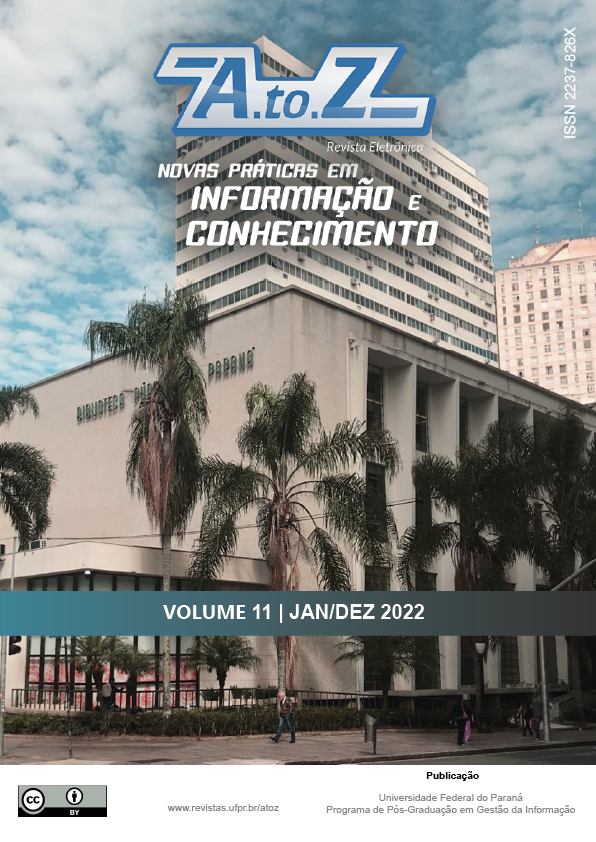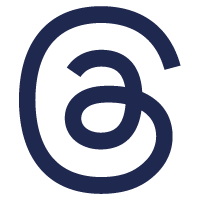Dados abertos dos Institutos Federais de Educação: análise de temas sugeridos pela Controladoria-Geral da União
DOI:
https://doi.org/10.5380/atoz.v11i0.82605Palavras-chave:
Acesso à informação pública, Dados governamentais abertos, Transparência, Institutos Federais de Educação.Resumo
Introdução: A abertura das bases de dados governamentais pode contribuir positivamente com a democracia, transparência e controle social, pois oportuniza ao cidadão o acesso, reutilização, modificação e redistribuição livre das informações não sigilosas dos órgãos públicos. Porém, nem todos os dados de interesse da sociedade se encontram publicados em formatos abertos no presente momento. Esse estudo verifica se os dados referentes aos Institutos Federais de Educação, Ciência e Tecnologia, que são comumente solicitados à Controladoria-Geral da União pela sociedade civil, estão sendo catalogados no Portal Brasileiro de Dados Abertos. Método: Foi conduzida uma pesquisa quantitativa no Portal Brasileiro de Dados Abertos com suporte da técnica de pesquisa documental, o que permitiu analisar os conjuntos de dados publicados pelos Institutos Federais. Criou-se um índice para analisar cada um dos 14 temas coletados, o qual originou um indicador quantitativo utilizado na comparação dos resultados de cada Instituto Federal envolvido na pesquisa. Resultados: Identificou-se que 73,70% dos Institutos Federais catalogaram pelo menos um conjunto de dados no Portal Brasileiro de Dados Abertos. No entanto, verificaram-se contundentemente diversas lacunas na disponibilização de dados abertos por parte dessas instituições, além da baixa aderência à abertura de dados em conformidade às recomendações da Controladoria-Geral da União. Conclusão: Estudos como o realizado neste artigo contribuem para que a Administração Pública, especialmente considerando o contexto dos Institutos Federais, tenham subsídios que indiquem possíveis pontos de melhorias no que tange às demandas da sociedade sobre transparência e governança.
Referências
Aleixo, D. V. B. S. (2020). O estado de anomia dos dados no acesso aos dados governamentais abertos no Brasil. Tese de doutorado, Universidade Estadual Paulista de Marília, Brasil. Retirado de https://repositorio.unesp.br/handle/11449/191686
Alencar, A., Xavier, D., Chaves, L., & Souza, D. (2018). Publicação e consumo de Dados Abertos Conectados Acadêmicos. Principia, (42), 136-145. Retirado de https://periodicos.ifpb.edu.br/index.php/principia/article/view/1988
Bergeron, P. (1996). Information resources management. Annual Review of Information Science and Technology, 31, 263-300. Retirado de https://ppggoc.eci.ufmg.br/downloads/bibliografia/Bergeron1996.pdf
Breitman, K. (2005). Web Semântica: a Internet do futuro. Curitiba: LTC.
Britto, G., Ruy, F. B., & Azevedo, C. L. B. (2020). Um ambiente para integração de dados abertos relativos à despesa pública. Ontobras, 13. Retirado de http://ceur-ws.org/Vol-2728/paper13.pdf
Cardoso, P. H. (2019). Ciência de dados aplicada a dados governamentais abertos sob a ótica da Ciência da Informação. Dissertação de mestrado, Universidade Federal do Rio de Janeiro, Brasil. Retirado de https://ridi.ibict.br/handle/123456789/1039
Carossi, D. F., Pedan, J. M., & Teixeira Filho, J. G. (2017). Utilização da metodologia “Grounded Theory" na identificação de informações para compor um plano de dados abertos de instituições federais de ensino superior. iSys-Revista Brasileira de Sistemas de Informação, 10(2), 171-192. Retirado de http://seer.unirio.br/index.php/isys/article/view/6152
Controladoria-Geral da União [CGU]. (2020). Manual de elaboração de planos de dados abertos (PDAs). Brasília, DF: STPC/CGU. Retirado de https://repositorio.cgu.gov.br/handle/1/46702
Chen, C. et al. (2020). Protein ontology on the semantic web for knowledge discovery. Scientific Data, 7(337), 1-12. Retirado de https://www.nature.com/articles/s41597-020-00679-9
Choo, C. W. (2006). The knowing organization: how organizations use information to construct meaning, create knowledge, and make decisions. International Journal of Information Management, 16(5), 329-340. Retirado de https://www.sciencedirect.com/science/article/abs/pii/0268401296000205
Gonçalves, V. (2017). PSO: uma ontologia de domínio sobre servidores públicos federais. Dissertação de mestrado, Universidade Federal de Pernambuco, Brasil. Retirado de https://repositorio.ufpe.br/handle/123456789/29774?mode=full
Klein, C. R. (2018). Transparência da gestão pública das autarquias federais de ensino vinculadas ao Ministério da Educação - MEC. Dissertação de mestrado, Universidade de Brasília, Brasil. Retirado de https://repositorio.unb.br/handle/10482/32187
Lemos, J. M. M. (2017). Um processo para publicação de dados abertos em institutos federais baseado em BPM. Dissertação de mestrado, Universidade Federal de Pernambuco, Brasil. Retirado de https://repositorio.ufpe.br/handle/123456789/25351
Lima, J. P., Cunha, S. F., & Maior Filho, U. G. S. (2017). Governo Aberto: um estudo de caso sobre o Instituto Federal da Paraíba. Encontro Brasileiro de Administração Pública, João Pessoa, PB, Brasil, 4. Retirado de http://plone.ufpb.br/ebap/contents/documentos/0073-088-governo-aberto-um-estudo-de-caso-sobre-o-ifpb.pdf
Macedo, D. F. & Lemos, D. L. S. (2021). Dados abertos governamentais: iniciativas e desafios na abertura de dados no Brasil e outras esferas internacionais. AtoZ: novas práticas em informação e conhecimento, 10(2), 14-26. doi: 10.5380/atoz.v10i2.77737
Monteiro, G. & Lucas, E. R. O. (2019). Dados científicos abertos: identificando o papel das políticas de gestão e das agências de fomento. AtoZ: novas práticas em informação e conhecimento, 8(1), 13-20. doi: 10.5380/atoz.v8i1.67253
Nunes, V. K. A. (2018). Plano de dados abertos nos institutos federais de Educação, Ciência e Tecnologia. Dissertação de mestrado, Universidade Federal de Viçosa, Brasil. Retirado de https://www.locus.ufv.br/handle/123456789/22591
Possamai, A. J. (2016). Dados abertos no governo federal brasileiro: desafios de transparência e interoperabilidade. Tese de doutorado, Universidade Federal do Rio Grande do Sul, Brasil. Retirado de https://www.lume.ufrgs.br/handle/10183/156363
Resolução nº 3, de 13 de outubro de 2017. Aprova as normas sobre elaboração e publicação de Planos de Dados Abertos, conforme disposto no Decreto nº8.777, de 11 de maio de 2016. Brasília, DF. Retirado de https://www.gov.br/conarq/pt-br/legislacao-arquivistica/resolucoes/resolucao-n-o-3-de-13-de-outubro-de-2017
Santarem Segundo, J. E. (2015). Web Semântica, dados ligados e dados abertos: uma visão dos desafios do Brasil frente às iniciativas internacionais. Tendências da Pesquisa Brasileira em Ciência da Informação, 8(2), 219-239. Retirado de https://revistas.ancib.org/index.php/tpbci/article/view/359
Silva, P. N. (2018). Dados Governamentais Abertos: Métricas e indicadores de Reuso. Tese de Doutorado, Universidade Federal de Minas Gerais, Brasil. Retirado de https://repositorio.ufmg.br/handle/1843/BUBD-AYNG4U
Zaidan, F. H., & Bax, M. P. (2013). Linked Open Data como forma de agregar valor às informações clínicas. AtoZ: novas práticas em informação e conhecimento, 2(1), 44-59. doi: http://dx.doi.org/10.5380/atoz.v2i1.41319
World Wide Web Consortium [W3C]. (2017). Data on the web best practices: W3C recommendation 31 January 2017. Retirado de https://www.w3.org/TR/dwbp/
Downloads
Publicado
Como Citar
Edição
Seção
Licença
A revista AtoZ é um periódico científico de acesso aberto e o copyright dos artigos e da entrevista pertence aos respectivos autores/entrevistados com cessão de direitos para a AtoZ no que diz respeito à inclusão do material publicado (revisado por pares/postprint) em sistemas/ferramentas de indexação, agregadores ou curadores de conteúdo.

Todo o conteúdo da Revista (incluindo-se instruções, política editorial e modelos) está sob uma licença Creative Commons Atribuição 4.0 Não Adaptada, a partir de Outubro de 2020.
Ao serem publicados por esta Revista, os artigos são de livre uso para compartilhar (copiar e redistribuir o material em qualquer suporte ou formato para qualquer fim, mesmo que comercial) e adaptar (remixar, transformar, e criar a partir do material para qualquer fim, mesmo que comercial). É preciso dar o crédito apropriado , prover um link para a licença e indicar se mudanças foram feitas .
A AtoZ não cobra qualquer tipo de taxa para submissão e/ou processamento e/ou publicação de artigos.


























